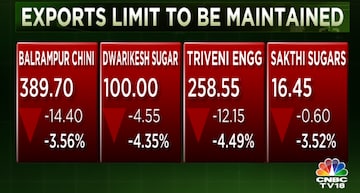
Union Food Secretary Sudhanshu Pandey on Monday said that India will continue to maintain the cap on sugar exports at 100 lakh metric tonnes (LMT), which, however, is the country’s highest-ever export of the commodity at 50 percent more than the previous year.
Terming the export cap as part of a well-thought out policy, Pandey explained that global supplies of sugar are likely to reduce as more and more sugarcane is being diverted for ethanol production to increase fuel blending in the light of rocketing international prices of crude oil.
Sugar stocks including Balrampur Chini and Dwarikesh Sugar closed lower by 4-5 percent on the BSE today.

In an interaction with CNBC-TV18, Pandey pointed out that various nations like Brazil have reduced tax on ethanol which will lead to a rise in blending of the renewable hydrocarbon with traditional fossil fuels.
Dismissing health concerns over side effects of fortification of rice with iron and other nutrients, he referred to an analysis by experts from All India Institute of Medical Sciences (AIIMS) which had clarified that the scheme has an in-built health monitoring system. The issues will be addressed via policy interventions at the national level as well as by steering committees constituted under Chief Secretaries of respective states, he said.
The government had earlier stated that rice fortified with three micronutrients — iron, folic acid and vitamin B12 — to be distributed under schemes in states should carry warnings for thalassemia patients.
A team of experts and activities had claimed that indigenous Adivasi people with thalassemia — who rely on the government’s food distribution — were given fortified rice posing health risks. The fortified rice packets were without any mandatory labels in some instances.
While noting a fall in wheat prices, Pandey maintained that the regulations to curb exports of the commodity will continue to remain in place even as the government will take an appropriate call on requests from some countries.
Last month, India banned wheat exports with immediate effect as part of the government’s efforts to control rising domestic prices and as heatwave across the country affected the domestic output.
India has already received requests for wheat supplies from Bangladesh, Indonesia, Oman, UAE and Yemen.
Pointing to global tariff rate quotas (TRQs) issued for 40 lakh metric tonnes of edible oil, with 20 lakh metric tonnes each for soya and sunflower oil, Pandey said that the prices have already come down by 8-10 percent internationally leading to rates in the Indian market cooling off.
Check out our in-depth Market Coverage, Business News & get real-time Stock Market Updates on CNBC-TV18. Also, Watch our channels CNBC-TV18, CNBC Awaaz and CNBC Bajar Live on-the-go!


2024 Lok Sabha Elections | Why Kerala is in focus as the second phase begins to vote
Apr 26, 2024 9:33 AM
Bengaluru Rural Lok Sabha election: Over 8% voter turnout recorded by 9 am
Apr 26, 2024 9:11 AM

